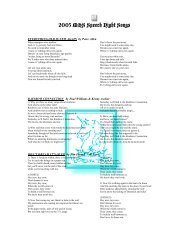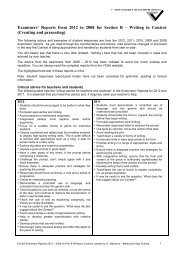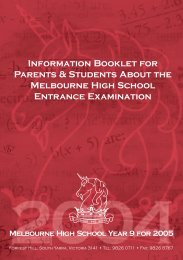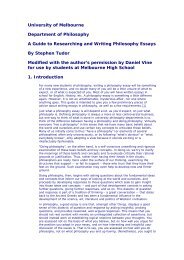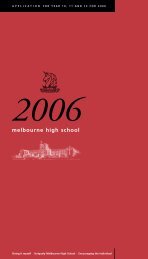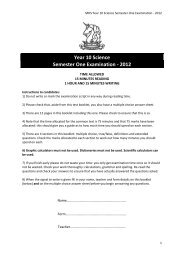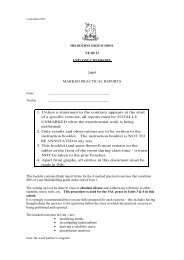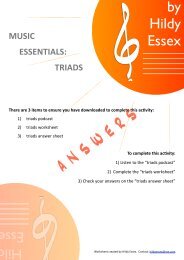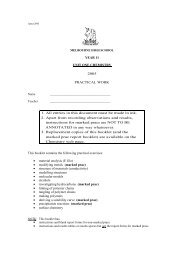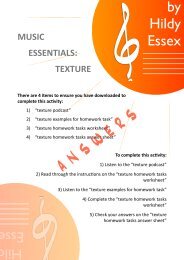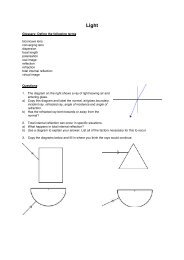Monologue Guidelines for students and teachers
Monologue Guidelines for students and teachers
Monologue Guidelines for students and teachers
You also want an ePaper? Increase the reach of your titles
YUMPU automatically turns print PDFs into web optimized ePapers that Google loves.
TD1 THEATRE CAT 3B O A R DOFSUIESVictorian Certificate of Education1999THEATRE STUDIESCommon Assessment Task 3: <strong>Monologue</strong><strong>Guidelines</strong> <strong>for</strong> <strong>students</strong> <strong>and</strong> <strong>teachers</strong>© BOARD OF STUDIES 1999Page 1 of 3
THEATRE CAT 3 2CAT 3: <strong>Monologue</strong><strong>Guidelines</strong> <strong>for</strong> <strong>students</strong> <strong>and</strong> <strong>teachers</strong>1. Each student will per<strong>for</strong>m a monologue selected from the list below.2. Students should be thoroughly familiar with the criteria <strong>for</strong> assessment.3. Students may choose to per<strong>for</strong>m any monologue listed. The 1999 list includes five female characters, fivemale characters <strong>and</strong> two gender neutral.4. Students should be aware of the whole play while preparing their selected monologue.5. There is no definitive interpretation. Students may interpret the text <strong>and</strong> stage directions as they considerappropriate. If, however, the interpretation diverges extensively from the playwright’s intentions <strong>and</strong> anexpected meaning is possibly obscured, then the student can explain their directorial choices in theirStatement of Intention.6. Students are advised to look <strong>for</strong> a balance of characteristics rather than focusing only on a single effectsuch as accent or physical characteristic.7. Memorisation of lines is an essential part of the character realisation in CAT 3 <strong>and</strong> would represent theminimal level of meeting the criteria. Reading from the text does not constitute a ‘per<strong>for</strong>mance’.8. Per<strong>for</strong>mance skills gained through Work requirement 3, ‘Stagecraft <strong>and</strong> acting’, <strong>for</strong>m the basis by whichthe monologue is contextualised.9. The assessors will <strong>for</strong>m the audience. They will be the only other persons present. They will be seated atthe front of the per<strong>for</strong>mance <strong>and</strong> under no circumstances may the assessors be asked to move.10. The monologue must be per<strong>for</strong>med over a period of no more than seven minutes. Students may use lesstime as appropriate to their interpretation. A total of ten minutes per student will be allocated <strong>for</strong> preparation,per<strong>for</strong>mance <strong>and</strong> clearing space. No additional time can be allowed. A timing device will indicate whenthe seven minutes is over. Students must stop at this time.11. Students are encouraged, but not required, to present assessors with a written Statement of Intention of nomore than 100 words. The statement should elaborate on choices which affect the interpretation of thestudent’s selected monologue.12. The per<strong>for</strong>mance will take place at a venue to be determined. Schools will be advised of both location <strong>and</strong>timing by the Board of Studies. The student will be allocated a specific time.13. An area will be available if <strong>students</strong> wish to warm up.14. Any edition of the prescribed texts may be used.15. Students are to select ONE of the following monologues <strong>and</strong> develop a per<strong>for</strong>mance.<strong>Monologue</strong> 1Jane’s speech from Confidentially Yours, Sydney, Currency Press, 1998, pp. 21–23 in the context of Speakingin Tongues, Bovell, A., Sydney, Currency Press, 1998.‘Anyway I was st<strong>and</strong>ing at the window <strong>and</strong> the lights were off . . . Nik was capable of something like that.’<strong>Monologue</strong> 2Helena’s speech from A Midsummer Night’s Dream, Shakespeare, W., NY, Signey, 1963, pp. 85–87.‘Lo, she is one of this confederacy . . . which death or absence soon shall remedy.’<strong>Monologue</strong> 3Celimine’s speech from The Misanthrope, Moliere, London, Penguin, 1959, pp. 51–53.‘On the contrary, I’m greatly beholden to you . . . I have any other motive than concern <strong>for</strong> your welfare.’Page 2 of 3
3 THEATRE CAT 3<strong>Monologue</strong> 4Laurie’s speech from This Old Man Comes Rolling Home, Hewett. D., Sydney, Currency Press, 1976, pp. 7–9.‘Will you shut up your racket, Joycee? . . . Many’s the heart that is aching.’<strong>Monologue</strong> 5Isabelle’s speech from Ring around the Moon, Anouilh, J., London, Methuen, 1950 (distributed by SamuelFrench), pp. 67–68.‘Well, are you satisfied now! Don’t you think you’ve had a great success? . . . What’s the matter?’<strong>Monologue</strong> 6Leon’s speech from Speaking in Tongues, Bovell, A., Sydney, Currency Press, 1998, pp. 26–27.‘About four or five days ago . . . The man has completely broken down <strong>and</strong> he’s weeping.’<strong>Monologue</strong> 7Old Bert’s speech from A Fortunate Life, Sydney, Currency Press, 1987, pp. 46–47.‘Suddenly all hell broke loose . . . It was now trench warfare.’<strong>Monologue</strong> 8Oberon’s speech from A Midsummer Night’s Dream, Shakespeare, W., NY, Signet, 1963, pp. 60–61.‘Thou shalt not from this grove . . . I will overhear their conference.’<strong>Monologue</strong> 9Faustus’s speech from Doctor Faustus, Marlowe, C., London, Penguin, 1969, pp. 336–8.‘Ah Faustus, now hast thou . . . Ah, Mephostophilis!’<strong>Monologue</strong> 10Acaste’s speech from The Misanthrope, Moliere, London, Penguin, 1959, pp. 48–49.‘Egad! When I examine myself closely . . . give <strong>and</strong> take on both sides.’<strong>Monologue</strong> 11Attendant’s speech from Oedipus Rex, Sophocles, London, Penguin, 1960, pp. 60–61.‘First <strong>and</strong> in brief – Her Majesty is dead . . . That loathing cannot choose but pity . . .’ (omitting the responsesof the Chorus).<strong>Monologue</strong> 12Chorus’ speech from Helen, Euripides, London, Penguin, pp. 177–179.‘There was a time, they say . . . she pardons none who taste the <strong>for</strong>bidden fruit.’Page 3 of 3



